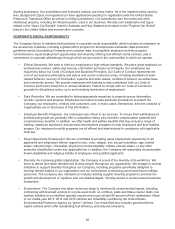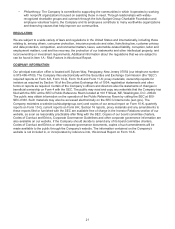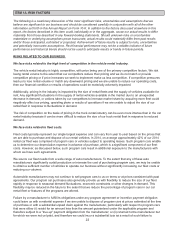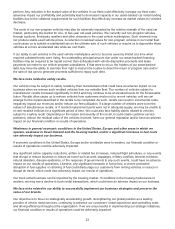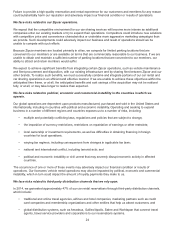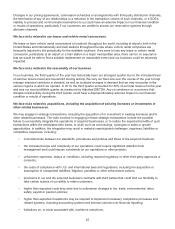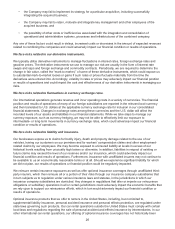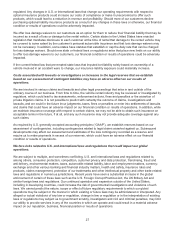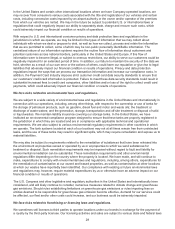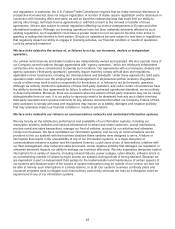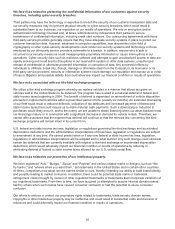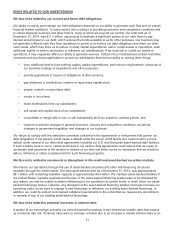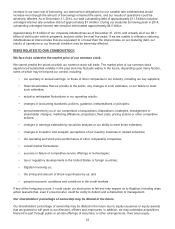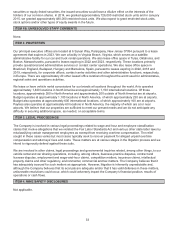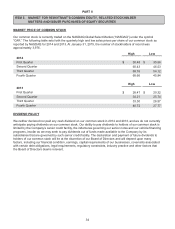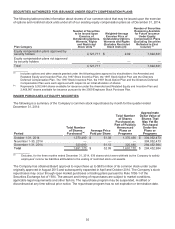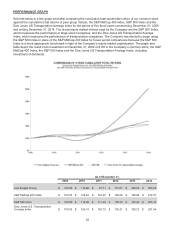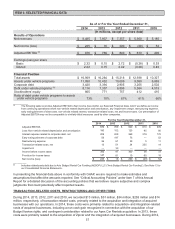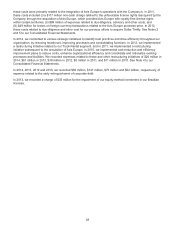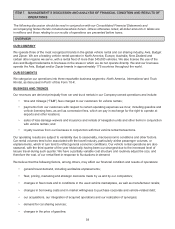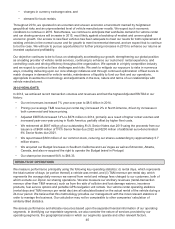Avis 2014 Annual Report Download - page 37
Download and view the complete annual report
Please find page 37 of the 2014 Avis annual report below. You can navigate through the pages in the report by either clicking on the pages listed below, or by using the keyword search tool below to find specific information within the annual report.30
We face risks related to protecting the confidential information of our customers against security
breaches, including cyber-security breaches.
Third parties may have the technology or expertise to breach the security of our customer transaction data and
our security measures may not prevent physical security or cyber-security breaches, which could result in
substantial harm to our business, our reputation or our results of operations. We rely on encryption and/or
authentication technology licensed and, at times, administered by independent third parties to secure
transmission of confidential information, including credit card numbers. Our outsourcing agreements with these
third-party service providers generally require that they have adequate security systems in place to protect our
customer transaction data. However, advances in computer capabilities, new discoveries in the field of
cryptography or other cyber-security developments could render our security systems and technology or those
employed by our third-party service providers vulnerable to a breach. In addition, anyone who is able to
circumvent our security measures could misappropriate proprietary information or cause interruptions in our
operations. Cyber-security risks such as malicious software and attempts to gain unauthorized access to data are
rapidly evolving and could lead to disruptions in our reservation system or other data systems, unauthorized
release of confidential or otherwise protected information or corruption of data. Any successful efforts by
individuals to infiltrate, break into, disrupt, damage or otherwise steal from the Company’s, its licensees’ or its
third-party service providers’ security or information systems could damage our reputation and expose us to a risk
of loss or litigation and possible liability that could adversely impact our financial condition or results of operations.
We face risks associated with our like-kind exchange program.
We utilize a like-kind exchange program whereby we replace vehicles in a manner that allows tax gains on
vehicles sold in the United States to be deferred. The program has resulted in a material deferral of federal and
state income taxes beginning in 2004. The benefit of deferral is dependent on reinvestment of vehicle disposition
proceeds in replacement vehicles within a prescribed period of time (usually six months). An extended downsizing
of our fleet could result in reduced deferrals, utilization of tax attributes and increased payment of federal and
state income taxes that could require us to make material cash payments. Such a downsizing or reduction in
purchases would likely occur if, and to the extent, we are unable to obtain financing when our asset-backed rental
car financings mature or in connection with a significant decrease in demand for vehicle rentals. Therefore, we
cannot offer assurance that the expected tax deferral will continue or that the relevant law concerning like-kind
exchange programs will remain intact in its current form.
U.S. federal and state income tax laws, legislation or regulations governing like-kind exchange and accelerated
depreciation deductions and the administrative interpretations of those laws, legislation or regulations are subject
to amendment at any time. We cannot predict when or if any new federal or state income tax laws, legislation,
regulations or administrative interpretations will be adopted and in what manner. Any such change could eliminate
certain tax deferrals that are currently available with respect to like-kind exchange or accelerated depreciation
deductions, which would adversely impact our financial condition or results of operations by reducing or
eliminating deferral of federal or state income taxes allowed for our U.S. vehicle rental fleet.
We face risks related to our protection of our intellectual property.
We have registered “Avis,” “Budget,” “Zipcar” and “Payless” and various related marks or designs, such as “We
try harder,” and “wheels when you want them,” as trademarks in the United States and in certain other countries.
At times, competitors may adopt service names similar to ours, thereby impeding our ability to build brand identity
and possibly leading to market confusion. In addition, there could be potential trade name or trademark
infringement claims brought by owners of other registered trademarks or trademarks that incorporate variations of
our registered trademarks. From time to time, we have acquired or attempted to acquire Internet domain names
held by others when such names have caused consumer confusion or had the potential to cause consumer
confusion.
Our efforts to enforce or protect our proprietary rights related to trademarks, trade secrets, domain names,
copyrights or other intellectual property may be ineffective and could result in substantial costs and diversion of
resources and could adversely impact our financial condition or results of operations.


